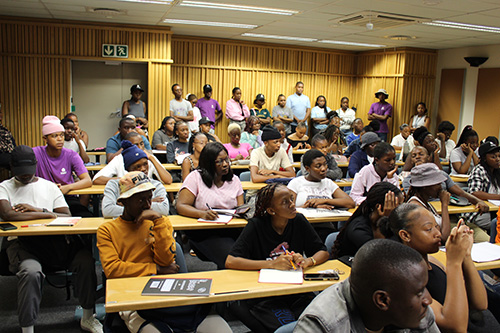By Gofaone Motsamai and Phenyo Mokgothu
The North-West University’s (NWU’s) School of Governance Studies hosted a panel discussion on Friday, 14 February 2025 on the Mahikeng Campus.
The discussion aimed to critically analyse President Cyril Ramaphosa’s State of the Nation Address (SONA), focusing on key themes, omissions and broader political implications.
The event took place against the backdrop of pressing global and domestic challenges, including the ongoing conflict in the Great Lakes region, the US president’s executive orders targeting South Africa, and threats from opposition parties to deliver their own alternative address.
This SONA was also significant, as it was delivered nearly a year after the 2024 elections, which led to the formation of the Government of National Unity.
The panel featured Dominic Maphaka, a lecturer in International Relations and political analyst; Perseverence Matshoba, a master’s degree student in International Relations; and Kamogelo Mamabolo, a final-year BA Social Sciences student in Politics and International Relations. The discussion was moderated by Dr Pumlani Majavu, a lecturer in Political Studies and International Relations.
One of the key issues raised was South Africa’s military involvement in the Democratic Republic of the Congo (DRC). Dominic criticised the president’s failure to provide clarity on the loss of South African soldiers.
"My main interest in this SONA is that while the president touched on foreign affairs, he failed to properly address the tragic loss of our soldiers in the DRC. He merely stated that it was part of South Africa’s foreign objectives of promoting peace and security but did not explain exactly what had happened. As the commander-in-chief, it is his responsibility to authorise such missions, yet there was no transparency on this critical issue."
The lack of detail raised concerns about government accountability, particularly in military operations.
Perseverence criticised the government’s failure to provide a clear strategy for industrialisation and economic growth. "The government has repeatedly emphasised the need for industrialisation, but how exactly do they plan to achieve it? There was no mention of a clear strategy. Simply stating that we must industrialise is not enough – we need a detailed plan outlining the steps to be taken, the sectors to be prioritised, and the resources to be allocated."
He also raised concerns about South Africa’s slow economic growth. "The projected economic growth for 2025 is only 1,3%. Yet, no alternative plan was proposed to boost the economy beyond this sluggish rate. This means we are likely to continue facing stagnant economic conditions with limited opportunities for expansion and job creation."
Furthermore, Perseverence highlighted the government’s failure to address key economic challenges such as inflation and graduate employment. "The government failed to outline how it intends to tackle key economic challenges such as the fiscal deficit and inflation. Without addressing these issues, economic growth will remain constrained, and the cost of living will continue to rise, placing additional strain on citizens."
He expressed concern over the lack of a clear strategy to integrate graduates into the economy. He noted that universities produce thousands of graduates each year, yet the government had not outlined how they would be employed. Without intervention, he warned, unemployment would continue to rise, further deepening the economic crisis in a job market that fails to create sufficient opportunities.
Kamogelo introduced the theory of structural functionalism, arguing that society requires a balance between different professions. "Should we all become engineers just because the job market demands it? Isn't that sector going to be affected in the same way as education and HR? So, I feel that it is unrealistic.”
Supporting this argument, Perseverence cited South Africa’s experience with the Nelson Mandela-Fidel Castro medical programme, which led to an oversupply of doctors struggling to find employment.
"Now, the government is pushing engineering, robotics, and coding. But what happens when these graduates face the same unemployment crisis? Meanwhile, we are neglecting social workers and psychologists – professions essential for societal well-being. The short-sighted focus on specific fields will only create new problems in the future."
The panel and the audience also discussed US sanctions against South Africa, raising concerns about their economic impact. In addition, they criticised the president’s minimal mention of gender-based violence, despite it being a national crisis.
The event concluded with calls for greater accountability and strategic planning in governance.
.jpg)
The panel discusses the significance of the political climate of SONA 2025.

The audience listens attentively.
